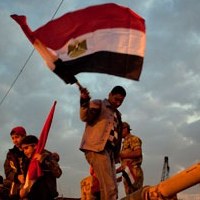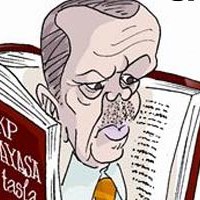![]()
Wed, July 13, 2011 | Rubin Reports | By Barry Rubin
The Incredibly Significant Missing Element in Egypt’s Revolution
As I always say, the most important stories about the Middle East — that really explain the region — are right there on the surface but are nonetheless neglected. Here’s one: there has not been a single, not a single, demonstration in Egypt against political Islamism.
Think about it. There is a powerful Muslim Brotherhood, openly seeking state power and Egypt’s fundamental transformation into an Islamist state. Then there are the Salafists — a new label applied to even more radical Islamist groups — that were in the past simply called by the name of the individual organization. There used to be two major ones. Why the use of “Salafist” now? Because there are too many to count.
And yet, despite this threat, not only to Egypt as a whole but daily life, there has been no organization of a demonstration, or a public campaign, or a Facebook campaign against the factor likely to produce a new dictatorship. True, the Christian Copts are defending their own rights, but that isn’t the same thing. Indeed, events only further underline that Muslims won’t speak out in any numbers against Islamism. Individual Muslims may courageously defend Christian rights publicly, but they are few and scattered.
Why is it that there is no anti-Islamist movement in Egypt? There are three reasons:
1. Fear and intimidation.
2. The eagerness of even liberal, moderate reformers to ally with the Brotherhood. Egypt is the only country in the Arab world (there are some exceptions, like the Syrian Brotherhood’s membership in the opposition coalition, but they are far more limited) where the reformers saw no problem to viewing the Brotherhood as allies against the existing regime. The April 6 Youth Movement, the “Facebook kids,” were closely cooperating with the Brotherhood. Muhammad ElBaradei was willing to be their poodle until the two sides quarreled. The Wafd Party is in partnership with the Brotherhood as are many other elements.
3. The belief that the Brotherhood will protect people from the Salafists. Talk about wishful thinking! Of course, there is an element of truth here. The Brotherhood might reduce the level of violence but that’s only because it believes that victory can be achieved without it and they are also willling to Islamize the country more slowly. Still, I’ll bet that Brotherhood members aren’t going to put up their fists to defend Christians, secularists, or women who don’t toe the line from Salafist attack.
What is happening is that some spray paint a picture of a cross and crescent labelled “almaniya” (secularism) which Islamists overspray with the slogan “Islamiya.” (Islamic country). But we have no idea, of course, how many of the spraypainters are Muslims.
In contrast, Lebanon, Algeria, Morocco, Iraq, Tunisia, Syria, and (non-Arab) Turkey and Iran there are powerful anti-Islamist sentiments in the oppositions.
Let’s compare Egypt with Tunisia, the Arabic-speaking country where European intellectual-cultural influence and moderate Islam has been proportionately most powerful. A Tunis movie theatre showed the daring anti-Islamist film “No God, No Master” by the Tunisian-French director Nadia El-Fani.
Even in relatively moderate, relatively secularist Tunis, Islamists attacked the theatre and the audience members. To understand the implications of having such “norms” in a society, consider how viable democracy would be if a mob in Texas or New York rioted at a movie theatre, wrecked it, and beat up audience members watching a film that they didn’t like. Afterward, nobody was arrested and the group responsible not only faced relatively little criticism but was likely to win lots of votes in the next election.
Remember that the probem in the Muslim-majority world isn’t only the strength of the Islamists but the weakness of the organized opposition to them.
At least, in Tunisia, one thousand people demonstrated against religious violence and radical Islamism, carrying banners that said “Free Tunisia, extremism out” and “Religious freedom, freedom of thought.”
The elections in Egypt set for September will be followed by those in Tunisia scheduled for October. The Ennahda Party, which is radical Islamist, is expected to do well though not to win. But we will see if Tunisia is going to have an October revolution or could emerge as a (temporarily? stable?) democratic state.



 RSS
RSS











The Incredibly Significant Missing Element in Egypt’s Revolution | #Egypt #Islamism http://bit.ly/p3Z15c
The Incredibly Significant Missing Element in Egypt’s Revolution | #Egypt #Islamism http://bit.ly/p3Z15c